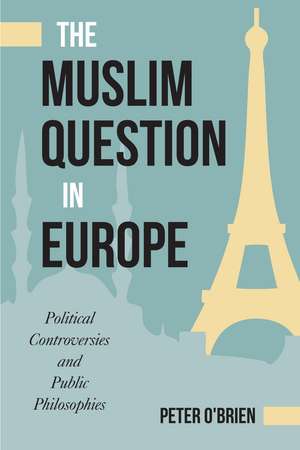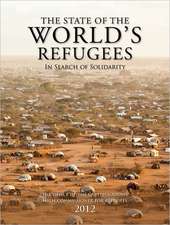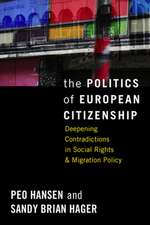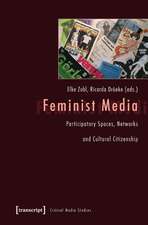The Muslim Question in Europe: Political Controversies and Public Philosophies
Autor Peter O'Brienen Limba Engleză Paperback – 28 feb 2016
An estimated twenty million Muslims now reside in Europe, mostly as a result of large-scale postwar immigration. In The Muslim Question in Europe, Peter O’Brien challenges the popular notion that the hostilities concerning immigration—which continues to provoke debates about citizenship, headscarves, secularism, and terrorism—are a clash between “Islam and the West.” Rather, he explains, the vehement controversies surrounding European Muslims are better understood as persistent, unresolved intra-European tensions.
O’Brien contends that the best way to understand the politics of state accommodation of European Muslims is through the lens of three competing political ideologies: liberalism, nationalism, and postmodernism. These three broadly understood philosophical traditions represent the most influential normative forces in the politics of immigration in Europe today. He concludes that Muslim Europeans do not represent a monolithic anti-Western bloc within Europe. Although they vehemently disagree among themselves, it is along the same basic liberal, nationalist, and postmodern contours as non-Muslim Europeans.
O’Brien contends that the best way to understand the politics of state accommodation of European Muslims is through the lens of three competing political ideologies: liberalism, nationalism, and postmodernism. These three broadly understood philosophical traditions represent the most influential normative forces in the politics of immigration in Europe today. He concludes that Muslim Europeans do not represent a monolithic anti-Western bloc within Europe. Although they vehemently disagree among themselves, it is along the same basic liberal, nationalist, and postmodern contours as non-Muslim Europeans.
Preț: 215.21 lei
Nou
Puncte Express: 323
Preț estimativ în valută:
41.20€ • 42.83$ • 34.16£
41.20€ • 42.83$ • 34.16£
Carte tipărită la comandă
Livrare economică 06-20 februarie 25
Preluare comenzi: 021 569.72.76
Specificații
ISBN-13: 9781439912775
ISBN-10: 1439912777
Pagini: 298
Dimensiuni: 152 x 229 x 23 mm
Greutate: 0.45 kg
Editura: Temple University Press
Colecția Temple University Press
ISBN-10: 1439912777
Pagini: 298
Dimensiuni: 152 x 229 x 23 mm
Greutate: 0.45 kg
Editura: Temple University Press
Colecția Temple University Press
Recenzii
“Reflecting a stunningly broad range of erudition resulting from decades of research, The Muslim Question in Europe provides an antidote for those grappling to understand the myriad migration-related challenges faced by Europeans. O’Brien contends that the complexities are best explicated by viewing the issues through a Kulturkampf lens pitting liberal, nationalist, and post-modernist insights against or complementary to one another. Of special interest is the timely chapter on terrorism and security. Here, too, he discerns a pattern of normative Kulturkampf and policy messiness. He views this outcome as very European. Islam, after all, is of Europe too.”—Mark J. Miller, University of Delaware and co-author of The Age of Migration
“Peter O’Brien discusses the huge amount of research on the major controversies surrounding Islam and Muslims in Europe when it comes to secularism, women’s rights, citizenship, and terrorism. He shows how and why these controversies reveal the inherent contradictions and dilemmas of European identities as much as they shed light on the so called ‘exceptionalism’ of Islam. The Muslim Question in Europe will be very relevant to students and scholars of religion, comparative politics, and immigration.”— Jocelyne Cesari, author of The Awakening of Muslim Democracy
“A thought-provoking and fresh look at the history of ideas that have shaped Europeans’ encounter with the historic settlement of Muslim minorities in Western Europe. O’Brien is an able guide to the best research in philosophy and the social sciences as he explores the nuances of western cultural contexts. The Muslim Question in Europe combines rich normative and empirical analyses that shed light on unresolved conflicts in European nation-states.”—Jonathan Laurence, author of The Emancipation of Europe’s Muslims and Integrating Islam
Notă biografică
Peter O’Brien is Professor of Political Science at Trinity University in San Antonio, Texas. He is the author of European Perceptions of Islam and America from Saladin to George W. Bush: Europe’s Fragile Ego Uncovered, and Beyond the Swastika. He has been a Social Science Research Council Fellow at the Free University in Berlin, and Fulbright Visiting Professor at Bogaziçi University in Istanbul and at the Humboldt University in Berlin.
Cuprins
Acknowledgements
1 Introduction
2 Kulturkampf
3 Citizenship
4 Veil
5 Secularism
6 Terrorism
7 Conclusion
Bibliography
1 Introduction
2 Kulturkampf
3 Citizenship
4 Veil
5 Secularism
6 Terrorism
7 Conclusion
Bibliography











